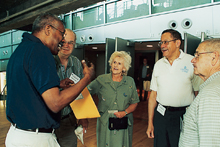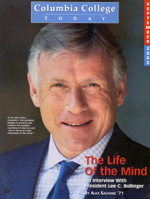 |
 |
 |
 |
|
by Derek A. Wittner '65 Several years ago, a small group of dedicated College alumni listened to a presentation about Columbia's modest participation rate and its impact on the College. As they listened, they became increasingly concerned about the implications of not attempting to correct this historical problem. Under the leadership of Dean Austin Quigley, those discussions led to a consensus that a program to increase participation was both a necessary and desirable investment. These alums personally committed significant resources over a four-year period to this initiative in order to reverse this situation. The first step was to survey alumni attitudes and interview professionals at peer institutions that have mature programs or already are instituting initiatives. In August 2000, a firm retained by the College conducted telephone interviews with more than 850 alumni of all ages (see CCT, February 2001). Simultaneously, staff members interviewed peers at Princeton, Stanford and other schools. The results were then incorporated into planning sessions at the College, involving alumni and staff, designed to produce a business plan. That plan is the blueprint for the Columbia Connections initiative. We view this as a work in progress that should be refined as we learn from our experiences. Why is this important?Certainly, there is a benefit from maintaining contact with friends made during undergraduate years. The shared experiences, within the classroom and beyond, will exist forever; to lose touch with those important years would be to lose touch with our growth as individuals. Needless to say, not all those experiences were positive, but it is the rare alum who cannot find some valuable legacy of his or her College experience. If nothing else, our survey results reflected widespread positive feelings about having graduated from Columbia College. Many alumni cited their incredible academic experience and intellectual growth - no surprise. But interestingly, most alumni interviewed also cited their positive experience beyond academics, which came as somewhat of a surprise given the often-related history of lengthy registration lines, residence hall deficiencies, questionable food service and so forth.
Without question, this residual good will is tinged with elements of an urban college experience: the grittiness of a city, the need to become "street smart" at Columbia to negotiate the Byzantine way in which it used to do things, and the challenges of a limited campus community. Notwithstanding this qualification, the evident good will gives us the foundation on which to build a more involved alumni community. If we are successful, then each of us, as alums, will have a greater stake in the College's future. Alumni willing to offer their time - whether to serve on a board, mentor current students or interview applicants - are essential to fulfill one of Dean Quigley's objectives: creating an intergenerational community. Alumni involvement is a powerful statement that the trust handed to this generation for the College's well being is taken seriously. The Connections program is intended to make the opportunities for involvement more visible and available. As a private school, Columbia is heavily dependent on its graduates to help support its mission. When U.S. News & World Reports ranks institutions and uses the alumni participation rate (the percentage of alumni who contribute) as a measure of alumni satisfaction, it is difficult to imagine that 66 percent of Princeton alumni are satisfied and only 32 percent of Columbia alumni are. But what it does reflect accurately is that a far greater number of alumni at Princeton and other peer schools have assumed personal responsibility for the future of those institutions. We believe that by engaging more alumni in the life of the College and facilitating connections with each other, we will encourage more alumni to value Columbia and, if able, to support it. Keep in mind that participation doesn't depend on absolute dollars; instead, it involves broadening the base of alumni who care enough to offer some, even modest, support of the College. One other contextual, and factual, note about participation rates: A school's participation rate will decline each year even if it keeps the same number of donors as the previous year. This results from adding each year's graduating class to the alumni population, a number that always exceeds alumni who pass away in any year. Therefore, if the participation rate is derived from a fraction
number of donors and the denominator grows each year, the numerator must grow just to stay even. |
|
|||||||||||||||||||||||||||||||||||||||||||||


